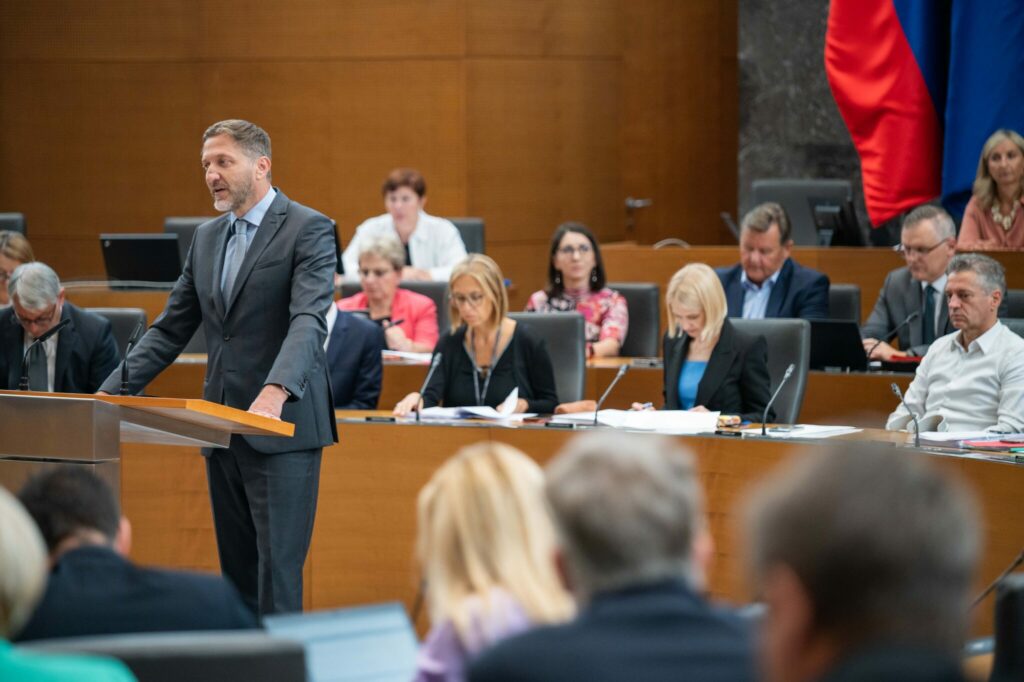At the latest regular session of the National Assembly, where MPs were discussing the draft state budgets for the next two years, representatives of the Slovenian Democratic Party (Slovenska demokratska stranka – SDS) were critical of the government’s failure to align income tax rates and social transfers with inflation, which means that the state is expected to raise 125 million euros more in income tax next year. From the start of the new year onward, the fiscal rule will be applied again, which would already be difficult under normal conditions, but after the floods, it is even more of a challenge.
At Tuesday’s resumed ordinary sitting, MPs were discussing the draft national budgets for the next two years. The National Assembly’s Committee on Finance approved the budget documents for 2024, which set a maximum expenditure of 16.2 billion euros, while revenue is expected to reach 14 billion euros. Slovenia’s deficit would thus amount to 2.2 billion euros, or 3.3 percent of gross domestic product.
Next year’s budget is now different from the one adopted by the National Assembly last November. In particular, there is a 720-million-euro increase in expenditure, which the government says is due to the provision of money to deal with the consequences of the floods. Minister of Finance Klemen Boštjančič said that the budget foresees 1.1 billion euros for this purpose. The approval of the 2025 budget has already been criticised – namely, the Fiscal Council has repeatedly warned the Golob government about unrealistic amendments to the budget, and now the government has also been criticised for adopting measures with significant budgetary implications after the budget documents have already been sent to the National Assembly. The excuse of State Secretary Saša Jazbec was that the floods occurred after the budget had been adopted and that the reconstruction costs had, therefore, been included in the projections for the following year.
The fact that the government is doing the opposite of what it should be doing and that an expansionary fiscal policy at a time of such high inflation is the wrong way to go was also pointed out by economist Anže Burger, who said that the government should be doing the opposite of what it is doing right now if the aim was really to bring inflation down.
MP Jelka Godec, leader of the SDS parliamentary group, expressed a significant concern about the budget, saying that “the insatiable nature of the Health Insurance Institute of Slovenia for petty cash is also a concern in the budget. From 240 million, the budget is now being increased to 420 million, and the coalition is boasting about how it has abolished supplementary health insurance. This is not true. They have just made it compulsory.” She went on to point out that all investments, at least in her municipality and the surrounding area, are being held up “not only in the area of road infrastructure, but also in other areas, in the areas of education, culture and so on,” she said.
Davorin Kračun, the president of the Fiscal Council, who has been warning about inadequate budget planning for a long time now, warned this time that “the planning in the budget documents is flawed and does not allow for adequate confidence” and that “the adoption of additional measures and their modification during the consideration of the budget documents increases the uncertainty,” reported the media outlet Forbes. Namely, Kračun believes that the incomplete and insufficiently credible statements create the appearance of accounting compliance with fiscal rules, while at the same time demonstrating a lack of understanding of the fundamental purpose of the rules. The “plastic budgeting” of the Golob government was also explained by MP Suzana Lep Šimenko.
SDS MP Glade: Such actions by the ruling coalition are worrying and inappropriate
When the budget document was first presented, the Minister of Finance announced that next year, there would be no annual adjustment of social transfers, the income tax scale and public sector wages to inflation, but then the coalition changed this. This was pointed out by SDS MP Rado Gladek. “After last Thursday’s government meeting, the Minister said that for 2024, they have agreed on a 70 percent adjustment of social transfers to inflation, which is still much worse than if social transfers were adjusted according to the current regime, which provides for adjustment according to the increase in consumer prices, and in full. The ban on public sector wage adjustments has also been lifted. However, the freeze on the harmonisation of the income tax scale remains in place. This behaviour by the ruling coalition is worrying and inappropriate,” he said. It is also worth noting that before the meeting of the Finance Committee on Saturday, the SDS and New Slovenia (Nova Slovenija – NSi) parties proposed an amendment to adjust social transfers by the full rate of inflation, which was rejected by the Committee.
T. B.


